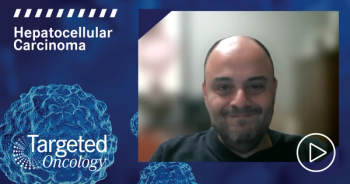
Hepatocellular Carcinoma Risk Stratification and Therapy
Episodes in this series

Richard S. Finn, MD: We talk about a multidisciplinary approach for the disease. The reason we do that and involve all of these various players is that depending on the stage, there are different modalities used. When you approach a patient, Catherine, how do you stage them?
Catherine Frenette, MD: Staging for liver cancer is very different than it is for other cancers, as you well know. I always teach my Fellows that when we’re talking about colon cancer, gastric cancer, or we’re talking about the TNM [tumor, nodes, metastases] staging system, it’s all about how much tumor is there and where it is. In liver cancer, we have to take into account the underlying cirrhosis, the performance status of the patient, and then we talk about how much cancer is there and where it is.
I really like the BCLC [Barcelona Clinic Liver Cancer] staging system because it really does go through that mental exercise of, how bad is their liver disease? What’s their Child-Pugh classification? What’s their performance status? Then, how big are the tumors? Where are they? Do they have metastatic disease, vascular invasion? This leads you down the path of various treatments. That’s really important when we’re thinking about staging, and the best staging systems for liver cancer, all of them include liver function as part of the staging process.
Richard S. Finn, MD: In medical oncology, we stage patients for several reasons. One reason is so we’re all talking the same language, right? When we look at data from a study, or we’re talking to our colleagues and we say a specific stage, we know what is being talked about and can compare studies. And it’s also prognostic. We can tell a patient, or at least have some assessment in our own mind of how they will do.
In the context of the BCLC staging system, we know there’s very early stage hepatocellular carcinoma. Generally, these are patients with small tumors, preserved liver function, who could potentially be cured with dissection or radiofrequency ablation. Or, patients who might have early stage disease but poor liver function, who might be cured with transplant.
And then there are the patients who have very advanced, decompensated liver disease. For these patients, hospice and supportive care might be best; or even a liver transplant if their tumor burden is acceptable.
And then we have the big groups of patients with intermediate disease and advanced disease.
Michael, Catherine and I are both on the West Coast, you’re on the East Case—at Duke Cancer Institute. At Duke, in your multidisciplinary program, do you tend to use BCLC? Also, for the audience, could you distinguish between intermediate disease versus Barcelona stage B, versus Barcelona stage C?
Michael A. Morse, MD, FACP, MHS: Yes. This is really where the liveliest discussions are likely to occur. As we get better and better therapies, we are seeing the suggestion that we could, perhaps, be treating some BCLC stage B patients, the multifocal disease, with systemic therapies. At the same time, I know our interventionalists certainly feel that there are some BCLC stage C patients that they can approach with something like Y-90 [yttrium-90] radioembolization.
We obviously have had some studies that have tried to compare these modalities—the SIRveNIB and SARAH trials. You interpret them based on what you know about managing the disease, where you come from, what tools you have. I would say that the really exciting direction, this isn’t standard of care yet, but it’s certainly where the research is going, is probably the need to combine these approaches.
Right now, you have to have the discussion regarding the standard of care. Is this person going to be a candidate for locoregional therapy, or are they going to get systemic therapy? In the future, we might talk about combining them.
Transcript edited for clarity.









































